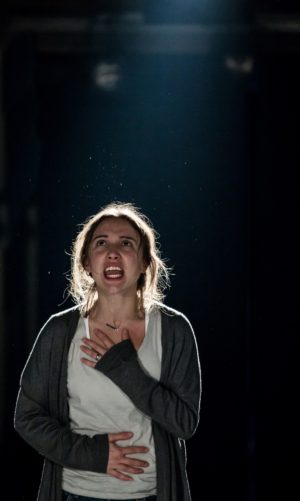You have no items in your cart. Want to get some nice things?
Go shopping
After several conversations with my theatre friends raving about Four Minutes Twelve Seconds and Ross and Rachel, a new James Fritz play was a cause for excitement. I came to Parliament Square expecting acutely observed class dynamics, fresh takes on political hot topics and bold staging decisions. The play was all of those things, but it was also one of the most uncomfortable theatrical experiences I’ve been through. Parts made me nauseous; throughout I felt compassion, horror and uncertainty tugging at my insides.
We open to Kat (Esther Smith) squabbling with her inner Voice (Lois Chimimba), who happens to be a ballsy Scottish woman. So far, so off-the-wall. Kat rises early, leaves her family and catches an early train to London. Bit by bit we learn what Kat is planning. Though the dialogue still sparkles with humour, an unbearable tension starts to build. Kat has decided that the only way to take a stand against the current political climate is to douse herself in petrol and set herself alight in Parliament Square. Things suddenly get very, very serious.
“Everyone who sees this is going to be changed and they’re going to see that when we don’t like what’s going on we can get out of our chairs and do something about it,” recite Kat and the Voice. It has unnerving echoes of Howard Beale’s call to arms in Network – “I’m mad as hell and I’m not going to take this anymore!” Like the slogan Beale shouts across the airwaves, there’s something hollow and insubstantial about it. It’s not something worth dying for. Fritz may have taken inspiration from the 140 people who have set themselves on fire in Tibet since 2009 to protest against oppressive Chinese rule, the youngest of which was just 15. In the context of the play, Kat’s need for the world to take notice of her invites us to infer more selfish motives. Does Kat desire change, fame or both?
Director Jude Christian makes the most of Fritz’s unusual staging decisions; the way he handles the self-immolation is all the more horrendous for its minimalism. Each of the three acts has a radically different sense of time and space, shifting gear and expanding the narrative. Every staging decision seems perfectly calculated to produce an emotional response, be it euphoria, claustrophobia or hopelessness. Christian’s stagecraft is innovative without being showy, never overshadowing the human drama.
Like the restlessly inventive staging, the writing refuses to settle on one perspective. In the first act Kat’s husband Tommy (Damola Adelaja) comes across as boorish and slightly thick. Her mother (Joanne Howarth) phones her to fuss over a barbecue that’s laughably trivial in comparison to Kat’s mission. Both of these characters become the moral centre of the play in the second act. Then, just when you think Fritz is condemning Kat’s actions, the third act comes and throws everything into confusion.
My only gripe is that, despite the play’s many twists in turns, I could see the end coming around halfway through. The plotting is almost too perfect, some might say mechanical. You can feel Fritz agonising over the central ethical dilemma, occasionally using characters as mouthpieces in a for-or-against tussle between taking a stand and accepting your own insignificance.
The political forces Kat struggles against also remain vague and nebulous. I felt like punching the air when Kat’s mother told her: “The world is a terrible place. But guess what? It always has been.” A few weeks ago I read how millennials were choosing not to bring children into a world that was “so f***ed up” and I remember wondering if the present day was really any worse than the genocides and nuclear stand-offs of the 20th century. Does Fritz want us to see Kat as a whiny millennial unable to see the bigger picture? It’s impossible to say.
Though there is a strong theoretical strand to Parliament Square, Fritz’s greatest achievement is to maintain a human perspective throughout. The relationships between the characters always felt very real and the relentlessly funny dialogue in the face of a very grim subject matter was astonishing. I left feeling shaken and changed. The play is definitely not for the faint-hearted, but it’s equally something you’re not likely to forget in a hurry. Like Kat’s political statement/stunt, it’s a horrific cry in the dark, unsayable and unknowable, screaming for us to look up from our cosy personal lives and take notice.
Parliament Square is at the Bush Theatre until January 6. Tickets are available from £10.

About Simon Fearn
Simon is a student at Durham University and aspiring theatre critic. He has reviewed at the Edinburgh Fringe with EdFringeReview and is Stage Editor for Durham's student newspaper, Palatinate. He has also written music reviews for W!zard Radio and Cuckoo Review.




